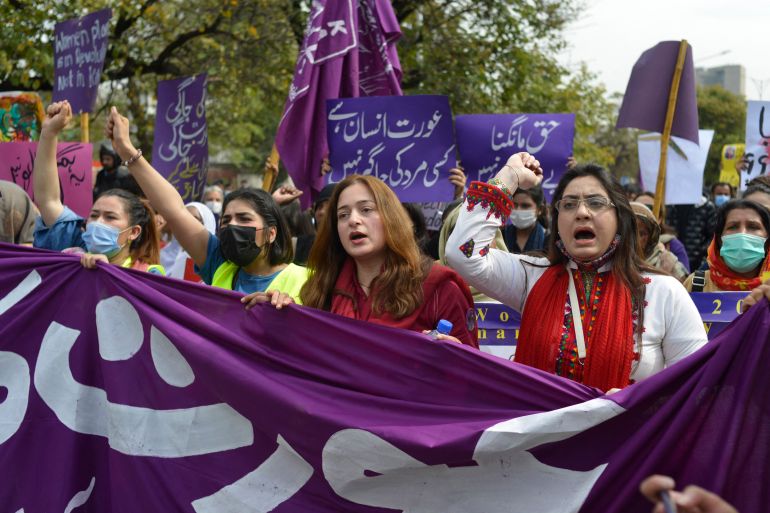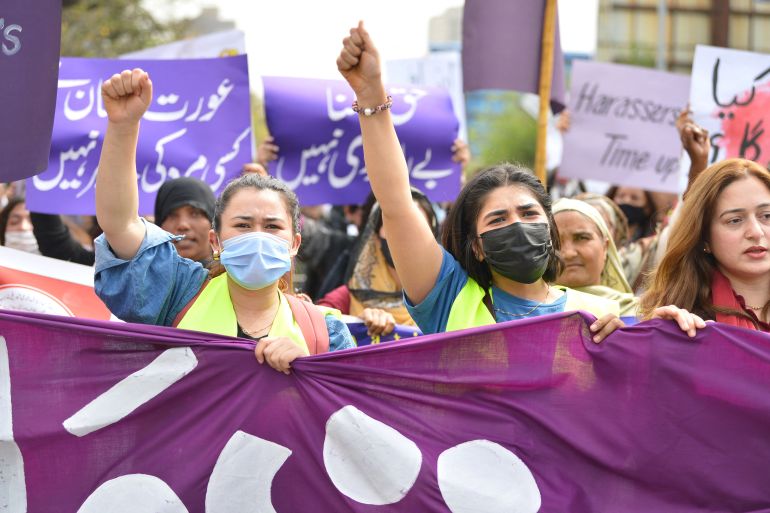M WAQAR..... "A man's ethical behavior should be based effectually on sympathy, education, and social ties; no religious basis is necessary.Man would indeed be in a poor way if he had to be restrained by fear of punishment and hope of reward after death." --Albert Einstein !!! NEWS,ARTICLES,EDITORIALS,MUSIC... Ze chi pe mayeen yum da agha pukhtunistan de.....(Liberal,Progressive,Secular World.)''Secularism is not against religion; it is the message of humanity.'' تل ده وی پثتونستآن
Wednesday, March 9, 2022
#Pakistan - Pakistan PM Khan faces ouster amid fears of failing economy
ADNAN AAMIROpposition closes in on the government, threatening IMF deal.
https://asia.nikkei.com/Politics/Pakistan-PM-Khan-faces-ouster-amid-fears-of-failing-economy
#Pakistan - Women rally in Pakistan despite attempts to shut down protest
Thousands of women attend events marking International Women’s Day, known as the Aurat March in Pakistan.
About 2,000 women have rallied in the Pakistani city of Lahore despite efforts by authorities to bar the protest and withdraw security for an event frequently the target of violence.Rallies on International Women’s Day have received fierce backlash since they were embraced four years ago in deeply conservative and patriarchal Pakistan.In a society where women have been shot, stabbed, stoned, set alight and strangled for damaging family “honour”, critics accuse rights activists of promoting liberal Western values and disrespecting religious and cultural mores. On Tuesday, dozens of events marking International Women’s Day – known as the Aurat March in Pakistan – were held across the country.
Non-violent counterprotests, dubbed “hijab marches”, were also staged by women from conservative religious groups in Karachi, Lahore and Islamabad where participants called for the preservation of Islamic values.

In the eastern city of Lahore, city authorities urged organizers to cancel the rally over safety concerns, threatening security would not be provided.
However, following a legal challenge, the Lahore High Court ruled the event could go ahead and authorities agreed to provide protection.
The women marched through the streets in a jovial atmosphere, chanting slogans such as “Give respect to women” and “End the patriarchy”.
They were guarded by riot police – and greeted by a small band of men chanting “end this obscenity”.
Student Sairah Khan, 23, cited recent high-profile cases of brutal violence against women “without consequences” for her attendance.
In Karachi – Pakistan’s largest city – about 1,000 women gathered in a festive atmosphere, with organisers conducting security checks as police stood by idly.
“We have only one slogan: ‘Equal wages, protection and peace’,” one woman chanted from a stage.
In the capital city of Islamabad, about 200 women rallied outside the city’s press club.

“We have come to raise our voices and highlight our issues,” said student Fatima Shahzad.
They were outmatched by more than 400 counter-protesters from conservative religious parties.
But organizer Farzana Bari pledged, “We will continue to assert ourselves.”
https://www.aljazeera.com/news/2022/3/8/women-rally-in-pakistan-despite-attempts-to-shut-down-protest